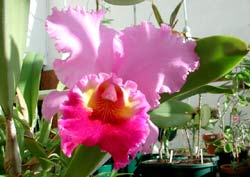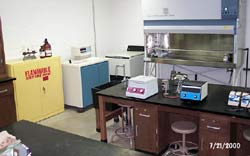
"Common
sense is a collection of prejudices which one has acquired by one's eighteenth
birthday." -- Albert EinsteinCLASSROOMS
 A large, comfortable lecture hall seating up to
65 students. The room includes an LCD projector for viewing virtually any visual
format including computer simulations, films, microscope slides, 2x2 slides,
digitally captured video, etc. A large, comfortable lecture hall seating up to
65 students. The room includes an LCD projector for viewing virtually any visual
format including computer simulations, films, microscope slides, 2x2 slides,
digitally captured video, etc.
A smaller classroom, seating 15-20, is used for
instruction in upper-level courses such as genetics, ecology, and physiology.
A small room set up for seminar or
discussion-format classes is equipped with computers for general use by biology
students.
Two rooms are also reserved for use as
faculty/student research space.
LABORATORIES
 Laboratories include an introductory lab for
zoology and botany, a multipurpose lab for ecology, comparative anatomy and
other advanced electives, a physiology lab with computer work stations, a
cell/genetics lab, and a molecular lab. Laboratories include an introductory lab for
zoology and botany, a multipurpose lab for ecology, comparative anatomy and
other advanced electives, a physiology lab with computer work stations, a
cell/genetics lab, and a molecular lab.
An additional lab is reserved
exclusively for students working on research projects. Students working on
research are given their own keys to labs so they can use them at any time.
Additionally, the department has a greenhouse,
herbarium, animal lab, and aquatics lab, all of which are designed to maintain
living organisms that can be used in courses or in research projects.
Off-Campus Field Research Areas
LeSuer Nature
Preserve
(online photos)
A recently acquired 16.5 acre plot of land within an easy
10-minute walk from campus provides new opportunities for field classes and
research. Rolling hills bisected by a large stream offer upland grassland, forest, riparian, and
aquatic habitats for study. Restoration of the entire area to
pre-settlement conditions (including 5 acres of native tall grass prairie)
provides abundant opportunities for student research. Water quality
monitoring and aquatic ecology studies are also possible in the stream.
Spring Grove Cemetery
Prairie
Members of the biology faculty are trustees of this remnant
prairie, giving students access to one of the finest virgin prairie plots in
Illinois. The one-acre prairie, an Illinois State Nature Preserve, offers
unique opportunities for research on prairie plants, soils, and the fauna that
inhabit them.
Hamilton Pond
This healthy, 1.5 acre freshwater pond was deeded to Monmouth College for use by
the biology department as a teaching resource. Just one block from campus
(north of the football field), Hamilton Pond is a rich source of aquatic plants
and invertebrates for use in laboratories. Aquatic vertebrates such as
turtles, frogs, and toads, also offer opportunities for research within a 5-minute
walk of campus.
Equipment
The Biology department at Monmouth has all
of the fundamental equipment one would expect in a modern biology laboratory in
addition to special equipment listed below. One of the great advantages of
learning at a small liberal arts college like Monmouth is that students have the opportunity to work hands on with these
instruments.
Basic
equipment includes growth chambers,
water baths, several incubators, spectrophotometers, balances, and of course
dozens of mono- and binocular microscopes and stereomicroscopes. A microtome including a freezing chamber for taking frozen
sections is available for histological work.
 The department has recently acquired substantial equipment to
enhance the cell and molecular biology labs, with an emphasis in
molecular genetics. The department has recently acquired substantial equipment to
enhance the cell and molecular biology labs, with an emphasis in
molecular genetics.
High-speed and
refrigerated centrifuges, electrophoresis chambers, a Nano-Pure water system, and a thermal cycler for
PCR enable students to explore and experiment in molecular biology. A CO2
incubator for culturing eukaryotic cells and a laminar flow hood facilitate
experiments in molecular biology and genetics.
The physiology lab is
equipped with several mechanical physiographs as well as computer work stations
for monitoring a variety of physiological processes. The lab has several
two-channel computer interfaces with software for MacOS or Windows. Bio
amplifiers and transducers for recording ECG, EEG, EMG, and galvanic skin
response work with this system. Additional transducers are available for a
variety of measurements in human, animal, and psychophysiology such as spirometers, grip force sensors, pulse plethysmographs, event markers, nerve
bath chambers, an intracellular probe, respiration monitor, blood pressure cuff
and transducer, and a skin temperature sensor.
Equipment for ecology
labs includes field sampling gear such as Sherman live
traps for small mammals, a variety of terrestrial and aquatic invertebrate sampling
equipment, seines, flow-meter, Kemmerer samplers, and a Hach water quality analysis spectrophotometer.
The greatest resource for students interested in ecology is our four field
research areas.

|

